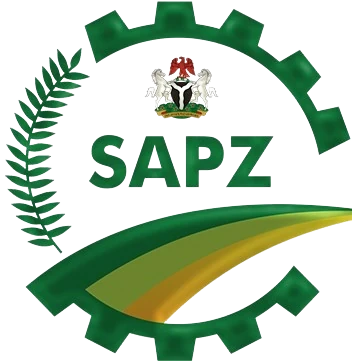1.0 Background
The Federal Government of Nigeria has received a Facility from the African Development Bank (AfDB), International Fund for Agricultural Development (IFAD) and the Islamic Development Bank (IsDB) to finance the cost of the Special Agro-Industrial Processing Zones Program (SAPZ), and intends to apply part of the proceeds towards carrying out various consultancy services. The SAPZ Program is being implemented in the seven (7) States and the Federal Capital Territory (FCT). The States are Ogun, Imo, Kaduna, Kano, Kwara, Cross River and Oyo.
The overall development objective of the SAPZ programme is twofold: (1) Support the development of SAPZ in high food production areas to supply the domestic food market and create exportable surpluses; and (2) Capacitate smallholder farmers, small agro-processors and traders, and community-based service providers, including women and youth; to take advantage of the market demand created by the SAPZ to sustainably enhance their income, household food security and resilience to climate change.
The SAPZ program will follow a two-phased program approach. Under phase I (2022-2028), the Government and AfDB, over a period of 5 years, will set up enabling infrastructure and investment policies in targeted states. IFAD will operate over a period of seven years. This slightly longer period will allow IFAD to empower smallholders to take advantage of the SAPZs when they are fully operational. The program will be expanded into additional states in subsequent phases, based on lessons learned and the availability of funding.
In phase I, the program will support the set-up of SAPZs in the Federal Capital Territory and seven States, namely Ogun, Kaduna, Oyo, Kwara, Kano, Imo, and Cross River. IFAD will focus on Kano and Ogun States, leveraging its ongoing programs.
Through a participatory selection process involving local authorities and communities at start-up, each participating Local Government Area (LGA) will select two focus commodities from among high-potential value chains that have been pre-identified in site-specific feasibility studies conducted during appraisal: Rice and Cassava for Ogun State and Rice, Tomatoes, Groundnuts, and Sesame for Kano State.
Phase I will directly benefit 1.5 million households, including private sector agribusinesses and agro-processors, smallholder farmers, agro -entrepreneurs and agro-dealers. IFAD investments, including through the Green Climate Fund (GCF), will target a total of 100,000 direct beneficiaries (and 500,000 indirect beneficiaries). Rural women and youth are core target groups. Opportunities for participation will be created for internally displaced persons and persons with disabilities.
The program has four components namely: ➢Component 1: Infrastructure Development and Management for Agro-Industrial Hubs (AIHs). Under this AfDB-led component, the programme will support the FGN in developing and setting up SAPZs in high potential States.
➢Component 2: Agricultural Productivity, Production, Market Linkages and Value Addition in SAPZ Catchment Areas. Under this component, SAPZ’s objective is threefold: (i) support smallholder farmers and small operators to increase their productivity/production and capacity to add value to raw materials on a profitable and environmentally sustainable basis; and (ii) link them to the additional market outlets offered by the Agro-Industrial Hubs (AIHs), off-takers supplying the local and national market who operate in the target area, and small processors/traders supplying the local markets, including primary processors operating in the Agricultural Transformation Centres (ATCs); iii) enhance the resilience and adaptive capacity of smallholder farmers to climate change.
➢Component 3: Policy and Institutional Development Support. The objective of component 3 is to support the development of enabling policies, legislation, and regulation for SAPZs in Nigeria to create a conducive business environment for private sector investment and to address inefficiencies and market failures in agricultural value chains.
➢Component 4: Programme Coordination and Management. This component will ensure that the programme is efficiently and effectively managed to achieve expected results.
2.0 Objectives of the Assignment
The overall objective of the assignment is to engage reputable Consultants who will undertake the identification and profiling of SAPZ farmers located in 4 LGAs supported by the program. In this regard, the Consultant will conduct a comprehensive identification and documentation of the profiles of smallholder farmers, with a specific focus on women and youth, involved in the Agricultural Value Chain crops of Rice and Cassava in selected 4 LGAs (Ijebu East, Yewa North, Obafemi/Owode and Odogbolu). Thus, conscious effort is required to ensure that women-only groups, youth-only groups and mixed groups are identified and profiled in the clusters. Also, targeted for inclusion in this profiling is the vulnerable group (people with disabilities and internally displaced persons). The profiling aims to:
i. Identify key value-chain actors, including farmers, processors, traders, and service providers, within the targeted local governments.
ii. Document the profile of the members of already mapped FOs based on their value chains;
iii. Determine the distribution of the profiled FO members by age, gender, vulnerability and value-chain;
iv. Provide a frame of the profiled FO members by LGA, by cluster and by value chain.
v. Analyze the roles, interests, and needs of stakeholders, focusing on women and youth, gender and age-specific aspects.
vi. Assess where the most women and Youth are represented along stages of the value chain and as well which crop value chains are more opened to women and Youth engagement
vii. Provide recommendations for enhancing the participation of women and youth in the program.
viii. Develop a detailed report outlining the findings, conclusions, and actionable recommendations.
Kindly find attached the link below for more details
